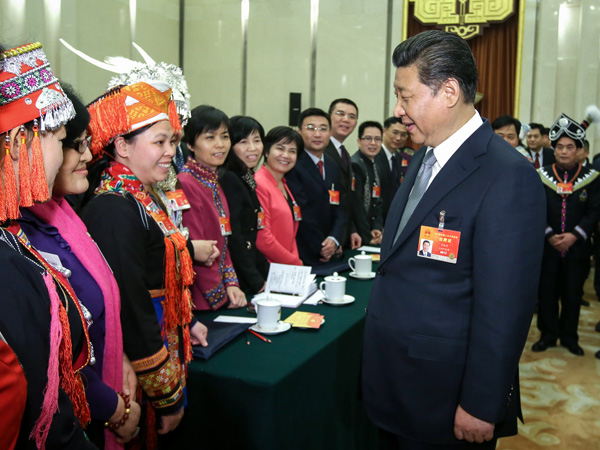Xi urges Guangxi to get ready for Silk Road
 0 Comment(s)
0 Comment(s) Print
Print E-mail China.org.cn, March 9, 2015
E-mail China.org.cn, March 9, 2015
President Xi Jinping urged south China's Guangxi Zhuang Autonomous Region on Sunday to accelerate its opening-up, as the region's key role in the fast-advancing Silk Road initiatives has often been emphasized.
The autonomous region should prioritize economic restructuring, build an open economy and expand cooperation with the Association of Southeast Asian Nations, Xi said at a meeting with Guangxi deputies to the National People's Congress.
Beijing has repeatedly underscored during the ongoing national legislative and consultative meetings that the plans to revive the Silk Road trading routes are a focal point of its 2015 diplomacy.
At least Chinese 31 provinces and regions have incorporated the Silk Road Economic Belt and the 21st Century Maritime Silk Road — networks connecting China with Europe through a host of Asian economies — into their Government Work Reports this year.
ASEAN countries are regarded as a key part of the new maritime Silk Road. Guangxi, which borders Vietnam, has been a major conduit for China-ASEAN cooperation, seeing a flurry of joint projects and key platforms for dialogue like the China-ASEAN Expo.
Xiao Yingzi, top official of Guangxi's coastal city of Qinzhou, said ASEAN countries welcome the Silk Road initiatives, which focus on improving connectivity and trade.
Trade between the city, site of the first industrial park co-built by China and Malaysia, and the 10-member group increased sharply last year, said Xiao, who is also an NPC deputy.
China has been ASEAN's top trading partner since 2009. ASEAN hopes to achieve bilateral trade with China of $500 billion by 2015 and $1 trillion by 2020, as well as two-way investment of $150 billion by 2020.
On Sunday, Xi also called for greater efforts to eradicate poverty in China and increase the pace of development in areas with concentrations of ethnic groups, such as Guangxi. More than 37 percent of the autonomous region's population are people from ethnic groups.
Guangxi lifted 960,000 people from poverty last year, reducing the number of the impoverished in the region to 5.38 million.
Xi called for efforts to improve the health in the region, as well as education, as a better-trained populace could break a cycle of poverty from generation to a generation.






